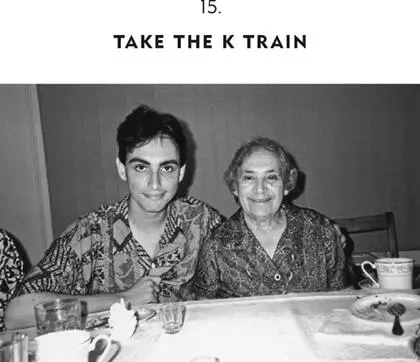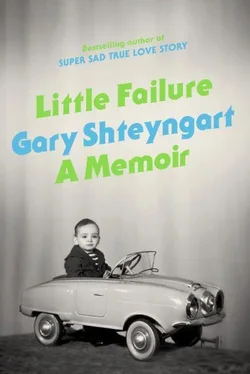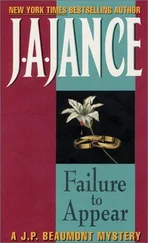“Dear Gnu, You are a funny republican who will be a democrat in a few years. Fuck Reagan! Bring on Jesse [Jackson]! Enjoy the Chinese whiz kids. †Love … Rachel W.”—from a classmate in the SSSQ autograph book, 1987
“Dear Gary, Just one question: Do you ever cry?”—another classmate
“P.S. For every fortune made — a crime has been committed.”—Mr. Korn.
“ Genug [“enough,” Yiddish], Gnu. Begin anew.”—a concerned art teacher

In our computer games, there’s a series of commands the player types on the status line when he finds himself in an entirely new environment.
>Look. Hear. Taste. Smell. Feel.
All my books are packed for our move to the new house with the backyard. The wood-paneled closet is empty. I open it with the same trepidation as always, but the Lightman is sitting in the corner, shaking, little pinpricks of light falling off his body. Now that my asthma is gone, I can breathe in fully as I watch him disappear. But this is no catharsis for me, I’m afraid. No metamorphosis. Even as my tormentor drowns in the darkness around him, my fists are clenched. “You motherfucker,” I say in my now-perfect English. You motherfucker .
*The Torah in printed form.
†At Stuyvesant High School, where I will soon enroll.

The author’s grandmother never passed judgment on the amazing shirt he is sporting here. He saved his best smiles for her.
FOR THE FIRST FEW YEARS of my life in Queens, America, I have no idea where Manhattan is. There are two or three skyscrapers of maybe twenty stories apiece rearing up where Union Turnpike smashes into Queens Boulevard. I am under the impression that that is Manhattan.
Eventually, I am taken to the bargain emporiums of Orchard Street on the Lower East Side, where I spend most of the day rooting around the clothing bins like a curious piglet, pulling out underwear and belts, socks and slacks, a winter jacket with a hood designed to cover the head of an urban Goliath, not a little milksop like myself. There’s something visually unclean about this whole place; in contrast to the park-like spreads of eastern Queens, Manhattan’s colors are reminiscent of a Soviet newscast — tractor browns, beet reds, cabbage greens. Mama and I turn off Orchard Street onto Delancey, where the steel cauldron of the Williamsburg Bridge overwhelms the cityscape, leaving me worried for the cars disappearing between its vast girders. And then — a loud pop. Gunfire! I grab my mother’s hand and pull myself into her coat. The violent, unhappy Manhattanites are shooting at us! We hear a few yelps from passersby, but soon the halfhearted terror gives way to laughter and Spanish. What happened? A car backfired, that’s what.
As a Hebrew school boy, I dream of someday moving to the most suburban of suburbs, where I will never have to look into another unfamiliar face, or indeed any faces at all. I see myself as a prosperous Republican left to his own devices in a backyard that stretches over a hill, swallows up a formerly public lake, and ends in a fierce bramble of barbed wire festooned with a PRIVATE PROPERTY sign. It’s an appropriate way to spend the 1980s. Young immigrant to city: Drop dead .
And then I am accepted to the Stuyvesant High School for the maths and the sciences on Fifteenth Street, between First and Second Avenues and between the dangerous districts of East Village, Greenwich Village, Union Square, Times Square, and the Ladies’ Mile.

September 1987. Manhattan Island. The car of visiting relatives makes its way down Second Avenue, with me and my knapsack in tow. The relatives, from some second-tier American or Canadian city, glance out apprehensively at the busy, dirty city. “Leave him here,” my mother says. “ Igoryochek ”—Little Igor—“can you walk across the street by yourself?”
“Yes, Mama.” We are worried that just like at Hebrew school the nonmagnificent car of our relatives will create problems for me with the student body. We don’t seem to understand that more than half the students at Stuyvesant are lower- to middle-class immigrant strivers much like ourselves, that China’s Fujian Province, the Indian state of Kerala, and Russia’s Leningrad Oblast lie at different corners of the same body of land. (The notoriously hard-to-get-into school requires top marks on a math test that students from the dweebiest countries can easily achieve.)
I also do not understand that I am about to walk into the rest of my life.
In the weeks before the start of Stuyvesant, I sit down with my mother and I tell her that I need to wear better clothes than I did at Solomon Schechter. I don’t tell my mother about the eight years of being subhuman at Hebrew school, because that would be tantamount to saying something bad about the Jews, which is treason, a capital offense. My parents sacrificed everything to bring me here to be free and Jewish, and I have taken that lesson to heart. I may have written my blasphemous Gnorah, yes, but only a year ago I led my parents on an insane hunt against crumbs of chametz, the leavened bread that is forbidden during the Passover holiday, castigating them for their lack of vigilance, nearly tearing off the shag carpet in search of month-old chunks of Lithuanian rye. When I pee I know that I am not allowed to think of any of the names of G-d or He will punish me, will lop off whatever’s left, although these days I mostly can’t help letting loose a stream of YahwehYahwehYahweh , followed by hours of deep existential grief.
“Mama, I have to dress better.”
In my quest for sartorial funding, I may have also mentioned to my mother that dressing better is a prerequisite for acceptance to an Ivy League college. This (sort of) lie may have loosened the clasp of her wallet, because getting into a top college has been the first, second, third, and last concern of all Stuyvesant students and their mamas from the day the high school was founded in 1904 and will be until the day its new waterfront campus finally sinks beneath the climate-stoked waves in 2104.
And so my first Stuyvesant memory actually takes place at Macy’s. My mother and I are roaming that midtown maze for the new hot brands, Generra, Union Bay, Aéropostale. I want to dress like the rich girls in Hebrew school did, so I am trying on loose, baggy shirts and sweaters, which will also hide my tits and settle softly over the pink keloid scar taking up the real estate of my right shoulder. No one shops like my mother. A small budget is stretched out into a shirt for every day of the week and pants and sweaters for every other day. I come out of the dressing room, and Mama presses the shirts against my body, holds them tight, to make sure I don’t bulge out upstairs, and, if I’m trying on jeans, to certify there is at least the suggestion of an ass. Until I make the acquaintance of a series of girlfriends in my thirties who will accompany me to dressing rooms all over Manhattan and Williamsburg, this is the closest I come to the ministrations of a woman.
When we walk out of Macy’s with two tightly packed bags under each arm, I feel my mother’s sacrifice far more than when she talks about what she’s left behind in Russia. I love my mother truly, but I am a teenager. The fact that my mother has just visited my dying grandma Galya in Leningrad and found her unable to speak or even recognize her, while the rest of her family, cold and hungry, waited in line for hours to score a desiccated, inedible eggplant, means much too little to me.
Читать дальше














